Quatation for architecture, engineering, consulting »
Form-finding
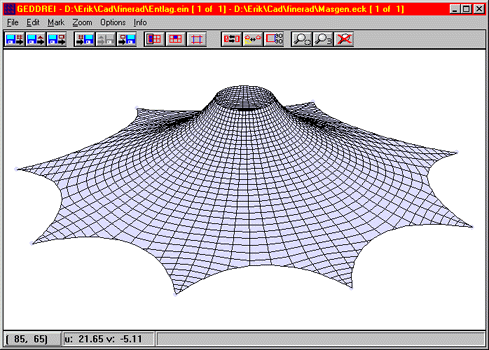 Determination of a suitable doubly curved surface form is unavoidable necessity during the process of designing funicular structures such as stressed textile roofs or tensioned membrane structure. Such a form can be determined by the usage of force equilibrant form-finding strategy. Variety of algorithms of this process can be presented starting from purely geometric approaches through relaxation techniques to the force-density method. The most appropriate method for solving different classes of problems is an opened question debatable through many years already. However, the force-density approach is, probably, the most acceptable in the industry as the most appropriate and flexible technique. Determination of a suitable doubly curved surface form is unavoidable necessity during the process of designing funicular structures such as stressed textile roofs or tensioned membrane structure. Such a form can be determined by the usage of force equilibrant form-finding strategy. Variety of algorithms of this process can be presented starting from purely geometric approaches through relaxation techniques to the force-density method. The most appropriate method for solving different classes of problems is an opened question debatable through many years already. However, the force-density approach is, probably, the most acceptable in the industry as the most appropriate and flexible technique.
Analysis of loads
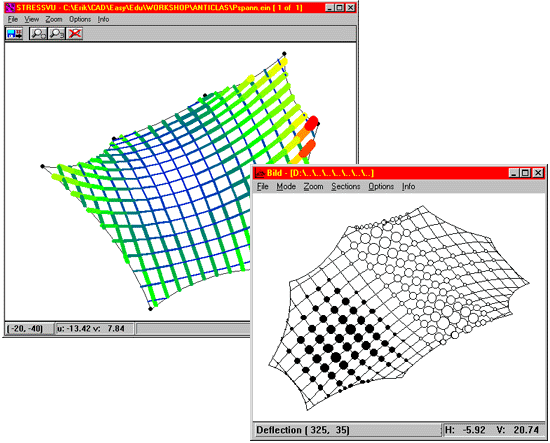 Statical structural analyses presents the behavior of lightweight structures (air supported structures) under applied loads. Implementing such analyses is necessary due to the large deflections with this class of structures is undoubtedly subject to and must be done this the usage of geometrically non-linear analysis software. Moreover, control of the graphical representation of deformation, force and stress results provides the relevant data as a analysis result of large amount of data required to model all lightweight structure models. Statical structural analyses presents the behavior of lightweight structures (air supported structures) under applied loads. Implementing such analyses is necessary due to the large deflections with this class of structures is undoubtedly subject to and must be done this the usage of geometrically non-linear analysis software. Moreover, control of the graphical representation of deformation, force and stress results provides the relevant data as a analysis result of large amount of data required to model all lightweight structure models.
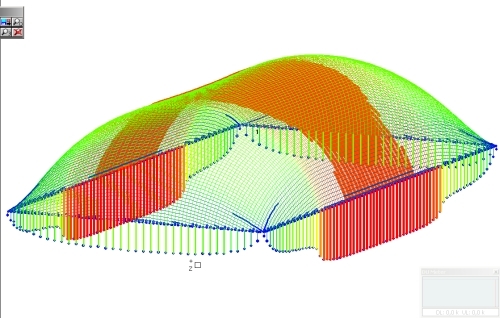
Generation of Cutting Patterns
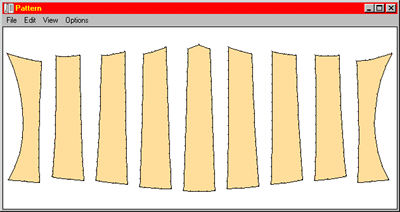 Generation of cutting patterns is the process conceptually analogous to the problem of creating maps of the surface of the earth meaning the creation of planar cloth geometries from doubly-curved form-found surfaces. Obviously, whatever technique is used, introducing distortions is an obligatory step in achieving desired results. However, it is common for more distortion than necessary to be applied, and for the distortion to be badly localized. Preferences should be given to the strategies which, as well as providing the highest quality patterns, enable sophisticated monitoring of the distortions due to the enormous variety of patterning situations. Generation of cutting patterns is the process conceptually analogous to the problem of creating maps of the surface of the earth meaning the creation of planar cloth geometries from doubly-curved form-found surfaces. Obviously, whatever technique is used, introducing distortions is an obligatory step in achieving desired results. However, it is common for more distortion than necessary to be applied, and for the distortion to be badly localized. Preferences should be given to the strategies which, as well as providing the highest quality patterns, enable sophisticated monitoring of the distortions due to the enormous variety of patterning situations.
3D Visualization
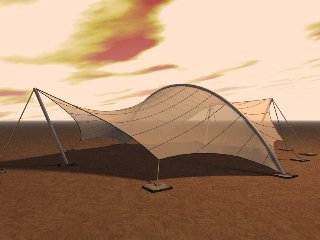 The creation of high quality visualizations of fabric structure designs using rendering systems is becoming more and more common. The main purpose of this procedure, having a much more generally valuable role in the design process, is generation of realistic images for client review or architectural competition entries and should be generated for engineering as well as aesthetic reasons. The creation of high quality visualizations of fabric structure designs using rendering systems is becoming more and more common. The main purpose of this procedure, having a much more generally valuable role in the design process, is generation of realistic images for client review or architectural competition entries and should be generated for engineering as well as aesthetic reasons.
Cadisi-Demo is available for download (1.5MB).
Easy-Demo is available for download (24MB).
Software developer website Technet GMBH.
| 
